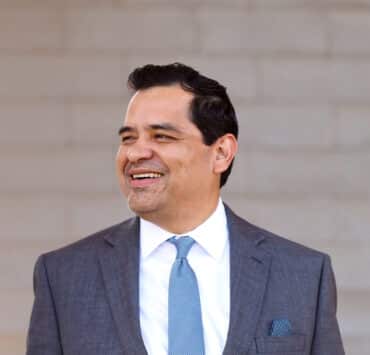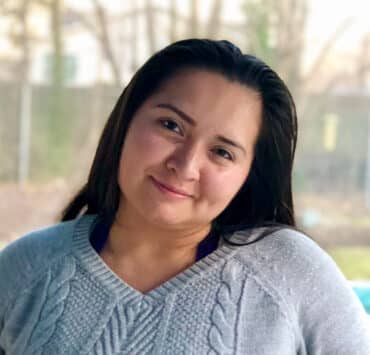|
Getting your Trinity Audio player ready...
|
When Freddy Jimenez attended a minority student job fair while at Brandeis University, he was an undergraduate biology major who was starting to realize that though he loved science, a career in research might not be for him. He’d begun enrolling in legal studies courses to explore that option.
“The first class I took was on the informed consent process, which is a key part of human subject research,” he says. “I realized that there was a place in law for somebody who really liked science.”
That fair would end up playing a key role in his career: a hiring manager from the pharmaceutical behemoth Johnson & Johnson took a chance on him despite his lack of experience and hired him as a clinical research assistant. “It was an unusual thing because they would normally take people with professional experience in that role,” he says. “But they took an intentional approach to saying, ‘I’m going to do this to increase the diversity in our in our talent pipeline, even if it means taking a risk.’”
Jimenez started at the company’s pharmaceutical research institute, working his way up from research assistant to FDA liaison while attending law school at night. Following a stint in the DC office of the law firm Akin Gump, he became an assistant general counsel to Johnson & Johnson proper, where he led the team of regulatory attorneys supporting the pharmaceutical group of companies.
“As you continue your career trajectory and become a leader, it’s no longer about you–it’s about the organization and its people.”
Freddy Jimenez
Now, after thirty years in the pharmaceutical industry, he is the senior vice president and general counsel for Celldex Therapeutics, a New Jersey-based biotech company developing targeted antibody therapeutics that could have a huge impact on addressing devastating diseases.
“I enjoy working in this industry, helping innovative researchers who come up with treatments for people in pretty dire straits,” Jimenez says. “You can really do well by doing good.”
Moving from big pharma to a startup was a significant change, but Jimenez has come to prefer the entrepreneurial environment, despite the struggles the come with it.
In biotech companies involved in Phase I and Phase II clinical research, the failure rate of studies is about 80 percent. When Jimenez first started, Celldex was developing a glioblastoma vaccine that showed a lot of promise but ultimately failed in Phase III.
Jimenez describes the process as a roller coaster of exciting discoveries and frequent failures, but what motivates his team to continue is the knowledge that they are working to help patients. “If you don’t take risks, there isn’t anything,” he says.
Along with juggling wins and losses, Jimenez is tasked with handling licensing agreements, compliance, employment issues, litigation, and SEC requirements around cybersecurity and corporate social responsibility. Managing his hefty to-do list is made possible by both his extensive experience and his leadership style. As his career has progressed, he’s focused more on delegating: not to lighten his load but to build others up, giving them the tools and practice to thrive.
“There’s a lot of work to be done in many aspects of law to get racial minorities interested. Every little bit counts.”
Freddy Jimenez
“As a young professional, it’s all about building your expertise and experience,” he says. “As you continue your career trajectory and become a leader, it’s no longer about you—it’s about the organization and its people.”
Jimenez’s colleagues outside the company have noted his dedication to his team. “I’ve worked closely with Freddy for several years and witnessed how he brings out the best in those around him and treats his colleagues with respect—key attributes for strong leadership,” says Kathleen A. McGee, partner at Lowenstein Sandler LLP.
Not only does Jimenez care about the growth of Celldex’s 140 employees, but he’s deeply passionate about lending a hand to the next generation of legal professionals. For the past six years, he has been involved in the mentoring program at his alma mater, Rutgers University.
He gets matched with first-year law students, and an ongoing dialogue takes place throughout their time in law school. Conversations often begin with coursework and technical aspects of law, but soon evolve into discussions regarding interests, career paths, and networking opportunities.
“It’s been very rewarding,” he says. “It’s important, I enjoy it, and I think it’s good for the profession because it introduces new types of people into it.”
He has also partnered with Rutgers’ Minority Student Program, taking on summer interns. Oftentimes his interns are first-generation college or law school students, or they don’t have a lot of lawyers in their networks. He is a strong proponent of exposing people from underrepresented backgrounds to the profession, so the field continues to grow and adapt.
“There’s a lot of work to be done in many aspects of law to get racial minorities interested,” he says. “Every little bit counts.”
“You can really do well by doing good.”
Freddy Jimenez
It’s this mentality that has Jimenez reaching out to an even larger student population that may have interests in both of his passions: law and science.
Jimenez is the executive sponsor of an employee resource group that has been working to start an outreach program with public schools and colleges in the communities where Celldex operates. The project was slowed down by the pandemic, but they’re hoping to expand this fall. Their aim is to bring in STEM track students for lab tours and to talk to scientists and Jimenez.
He explains that when you think about the building blocks needed to earn a PhD, it’s hard to get there if students are starting with limited economic and educational resources and have limited role models.
“That’s not good from a representation perspective,” he says. “We’re a small company, but hopefully we can help.”
We congratulate Freddy Jimenez on the well-deserved appointment. Recognized as Delaware’s premier law firm, Morris Nichols handles high-stakes matters in the four key areas of corporate litigation, alternative entities and corporate counseling, bankruptcy and restructuring, and intellectual property litigation. Morris Nichols is a leader in shaping Delaware Law. morrisnichols.com

